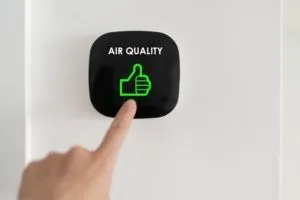
Your home’s indoor air quality (IAQ) can impact your health and comfort. Generally, we spend more time indoors in the winter months, making your IAQ a more pressing concern. Fortunately, you can boost your IAQ starting today.
You can explore seven ways to improve indoor air quality in the winter with our team at Ambient Edge. We can step in to help with the improvements and guide you throughout the process.
#1: Change the Filter in Your HVAC Unit
HVAC systems use filters to remove pollutants from the air. These filters pick up dust, debris, pollen, pet dander, and even some bacteria. Unfortunately, over time, your filters become clogged with the contaminants they pick out of the air.
Changing your filter regularly keeps your system from blowing these contaminants through your home and diminishing your IAQ. Regularly changing your filters also reduces the strain on your HVAC unit, allowing it to work more efficiently.
You Can Upgrade Your HVAC Filters
You may consider upgrading the filters you use in your HVAC system. Some homeowners switch to a filter with a higher efficiency rating to improve particulate removal. Just make sure you purchase a filter that fits properly in your system.
#2: Schedule an Air Duct Cleaning
Ducts move air through your home when you have an HVAC system. Over time, dust and contaminants in the air settle along the ducts, building up and spreading through your home. This spread can negatively impact your IAQ.
Fortunately, professional duct cleaning gets rid of dust along with the buildup of mold and other allergens. In addition, the duct cleaning process usually takes only a few hours, quickly improving your IAQ in the winter.
#3: Keep Humidity Levels on Your Home Low
High levels of humidity in your home can decrease your IAQ. Humidity encourages the growth of mold, which can spread through vents and lead to allergic reactions like coughing, sneezing, and shortness of breath.
Dehumidifiers can reduce the moisture in the air, allowing you to keep your home at a comfortable humidity level all year long.
#4: Boost Your Cleaning Schedule
Lowering the dust levels in your home can help improve indoor air quality in the winter from the source. Cleaning your carpet and rugs every week can reduce the number of particulates in your home, for example.
You may also want to dust regularly. While doing your cleaning, make sure you use non-toxic cleaning products, if possible. Harsher chemicals can linger in your space, dragging down your IAQ instead of improving matters.
While clzaning, consider changing the other air filters around your home. For example, you may find filters in your:
- Vacuum cleaner
- Kitchen vent
- Dryer
Keeping these vents clean helps limit the buildup of dust in your home, which can decrease the IAQ in the winter.
#5: Use Vents When You Cook
Cooking can release contaminants like nitrogen dioxide or even carbon monoxide. Additionally, it can send other particles into your air supply, including smoke, if something goes wrong. All of these factors can bring down your IAQ.
Fortunately, you can turn on a vent while cooking in the winter to minimize the effects on your IAQ. In the summer months, you may consider opening a window and using your kitchen hood system.
#6: Consider Indoor Plants
Plants can naturally filter the air, removing carbon dioxide and releasing oxygen, freshening up your home. Many plants can thrive even in relatively low levels of light, making them a perfect choice for the winter months.
Plants also provide natural beauty to your home, making them a great way to improve indoor air quality in the winter.
#7: Set Up an Air Purifier
Finally, the professionals often recommend setting up an air purifier for improved IAQ in the winter. You may select models that remove the following:
- Particulate matter
- Gas and chemicals
- Odors
- Bacteria or viruses
- Pollen
- Animal dander
- Smoke
Removing these substances from the air can help you breathe more easily at home in the winter.
Is Indoor Air Quality Worse in the Winter?
Now that we’ve discussed seven ways to improve indoor air quality in the winter, you may wonder why we focused on the winter season. Generally, the colder months drag down the IAQ of your home.
Part of the reason for diminished IAQ in the winter comes from the increased insulation in modern homes. The insulation helps keep your home warmer but also reduces ventilation, meaning you inhale more recirculated air.
Fortunately, you have multiple methods available to boost your IAQ, including contacting HVAC professionals who can replace your air filters and clean your ductwork.
What Are the Results of Poor IAQ in the Winter?
Why focus on boosting your indoor air quality in the winter? IAQ can have numerous effects on your health. For example, even limited exposure to poor air can worsen asthma or increase your chances of facing pneumonia.
Furthermore, long-term contaminants in the air can increase your chances of developing certain conditions, like heart disease. Therefore, we believe it’s essential to take steps to improve your overall IAQ all year long.
You can start removing allergens to boost IAQ right now.
Find Out How You Can Improve the Air Quality in Your House in the Winter
You’ve explored seven ways to improve indoor air quality in the winter. You can get more tips for boosting your IAQ and assistance with professional duct cleaning by reaching out to our team at Ambient Edge. We’re ready to schedule your appointment today.
Find out more about how we can help by calling or completing our online contact form.



